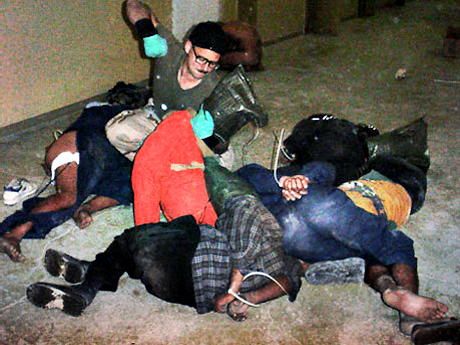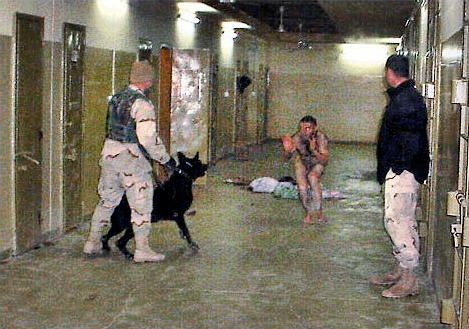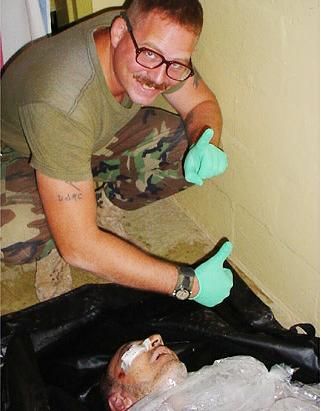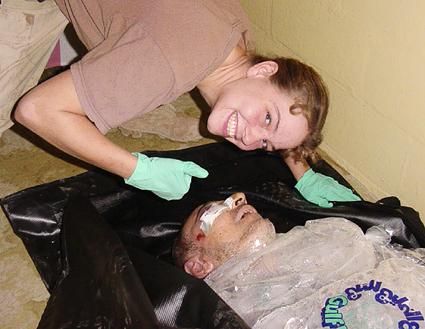 #1: FOOD POISONING
#1: FOOD POISONING
In May of 2004, multiple cases of food poisoning–apparently caused by some bad apples–spread throughout Washington. Symptoms were mild. No one missed work. Or even lunch. Yet gastric distress was a constant topic of conversation:
“Appalling,” said Senate Majority Leader Bill Frist,
“Horrific,” said Senate Minority Leader Tom Daschle,
“My stomach gave out,” said Sen. Saxby Chambliss…
5/6/2004: Standing in the Rose Garden, President Bush informed the press that his stomach, too–indeed the collective stomach of the entire United States–was roiling and churning:
“I told [King Abdullah] I was sorry for the humiliation suffered by the Iraqi prisoners….I assured him Americans, like me, didn’t appreciate what we saw, that it made us sick to our stomachs. I also made it clear to His Majesty that the troops we have in Iraq, who are there for security and peace and freedom, are the finest of the fine, fantastic United States citizens, who represent the very best qualities of America: courage, love of freedom, compassion, and decency.”
Q: Should Secretary Rumsfeld keep his job?
BUSH: “Secretary Rumsfeld is a really good Secretary of Defense….
The acts were abhorrent, Steve. They sickened my stomach. I know they sickened yours, too. You’re a decent American. Any decent soul doesn’t want a human being treated that way. And it is–it’s–it’s a stain on our country’s honor and our country’s reputation. I fully understand that. And that’s why it’s important that justice be done…. And we’ll find out the truth. We’ll take a good look at the whole system to determine–to make sure this doesn’t happen again. But I am–I am–I am sickened by what I saw, and sickened that somebody gets the wrong impression of people who are serving this country and this world with such dignity.”
5/13/2004: As incidents of the food poisoning raged beyond Washington, Jeff Jacoby of The Boston Globe mentioned his illness in an article: “As one who believes that this war was necessary above all on moral grounds, I’m sickened by what they [US soldiers] did.”
But apparently Jacoby (along with Sen. James Inhofe and others) was stricken by a mutated strain of the poisoning, for what made him feel sickest of all was reading about the sickness:
But I’m sickened as well by the relish with which this scandal is being exploited by those who think the defeat of the Bush administration is an end that justifies just about any means. I’m sickened by the recklessness of the media, which relentlessly flogged the graphic images from Abu Ghraib, giving them an in-your-face prominence that couldn’t help but exaggerate their impact. And I’m sickened by the thought of how much damage this feeding frenzy may have done to the war effort.
This new meta-illness puts Jacoby at a one-step remove from the poison’s source. He is not so much sickened by the tainted Abu Apples as by journalists who write about them. In fact, in this morphed version of the poisoning, certain (unpatriotic, left-leaning) journalists take the place of the Apples, for it is they who employ “any means,” they who take sadistic delight in torture, and they who are described with the words “relish,” “exploited,” “recklessness,” “relentlessly flogged,” “in-your-face,” “impact,” “damage,” and “frenzy.”

Original caption: A US soldier with his right arm and fist cocked appears prepared to strike one detainee in a pile of detainees.
Caption viewed under influence of the meta-poisoning: Anti-Bush journalist relentlessly flogs Jeff Jacoby in a pile of abused American newspaper readers.
 #2: MOTION SICKNESS
#2: MOTION SICKNESS
5/8/04:
Q: Does the President take any responsibility for what happened at Abu Ghraib? And as the Commander-in-Chief, or as the President of the United States, is he responsible? It was on his watch.
McCLELLAN: Helen, the people who are responsible need to be held accountable. That’s what the President believes. This —
Q: Does he think he’s responsible?
McCLELLAN: The actions of a few do not represent our United States military. Our United States military is committed to adhering to the highest standards of conduct, and they’re committed to adhering to our international obligations in treating prisoners —
Q: We didn’t abide by our international —
McCLELLAN: — and treating prisoners humanely. And the vast majority of our men and women in the military are upholding those standards of conduct. And we appreciate —
Q: He doesn’t take any responsibility, is that what you’re saying?
McCLELLAN: The people who are responsible for this need to be held accountable. That’s what the President believes–because what they did does harm what we are working to achieve, and it does not represent what America stands for, and it does not represent what the United States military stands for. And that’s why when these allegations came to light, the Pentagon and the military took strong steps to address it and hold people responsible and correct this, correct any problems that may exist. And the President wants to continue to receive updates about these investigations going forward, and that’s what he expects.
In the exchange above, McClellan employs several of his more vertigo-inducing maneuvers. He opens with “The Synonym Swirl” (aka “The Tautological Tornado”), which here hinges on the fact that “responsible” and “accountable” mean the same thing. Scotty spin-cycles his listeners with a sentence of double-speak, thereby reserving a whole separate sentence for the appearance of the President. Blameful “people” skulk on one side, sequestered in their own linguistic gulag. Then–across the divide–the President emerges, spotless, shining, and armored as ever by faith: “That’s what the President believes….” Scotty pries the values gap open yet further: they do harm while we are working. So don’t you get confused. Or rather, please do. He follows this gambit with “The Conditional Cascade,” a technique in which “harm” is briefly glimpsed, then disappears down a waterfall of “allegations” and “problems that may exist.” And he concludes with a move he’ll continue to perfect in the year to come: water-hosing his questioners with a torrent of ongoingness, whirling them on whitewater words that heave them back to the past and forward to the future, until they’re too dizzy to perceive the present and are spit ashore, spiral-eyed, motion sick, merely mumbling `thank you’:
McCLELLAN: Again, you keep asking these questions that are related to an ongoing investigation…..and those are questions that have already been addressed.
Q: No they–I’ve never heard this before. Have you?
McCLELLAN: The question has been asked before.
Q: We haven’t heard an answer….
Q: There hasn’t been an answer…
Q: What was your answer?
McCLELLAN: You asked this question last week, and–
Q: And I’m asking it again.
McCLELLAN: The President has said what our answer is to these questions. We’ll be glad to talk about all these issues once the investigation is complete.
Q: Why can’t you talk about it now?
McCLELLAN: Well, that question I addressed a couple weeks ago.
Q: Thank you.
McCLELLAN: Thank you.
 #3: NAUSEA
#3: NAUSEA
“The words had vanished and with them the significance of things, their methods of use, and the feeble points of reference which men have traced on their surface.” ~ ~ J.P. Sartre, Nausea
As Sartre recognized, words can be slippery nausea-inducing things, precisely because they’re not things. And as Magritte knew, visual images can also be treacherous, especially when combined with words:

We’ve grown leery about naming things, at least some of the time. The name “terrorist” is one we use quite freely, downright promiscuously. In fact, by Presidential decree, it now applies to anyone “not with us.” But, in other instances, we exercise caution about giving names to what our eyes perceive. Here’s an example:

<u>Caption</u>: “In what appears to be a hallway, a hooded detainee, seems to be handcuffed in an awkward position atop two boxes. The frame seems to show the prisoner’s ankle cuffed to the door handle behind him.”
This particular area of Abu Ghraib, where prisoners targeted for interrogation are held, is known as “the hard site.” And evidently sight is hard here. “A detainee seems to be handcuffed”?…… “The frame seems to show”?…..
“In what appears to be a hallway”???
Well. Thank goodness we’re not jumping to any conclusions.
I consulted two dictionaries about that baffling spacial enigma provisionally known as a “hallway.” The OED states that “hall” is “Old English from Germanic: related to HELL.” My battered Random House says it’s “akin to Old English helan = to cover, hide.”
This appears to be the right word.

<u>Caption</u>: “An unmuzzled dog appears to be used to frighten a detainee at Abu Ghraib prison in Iraq. Two military dog handlers told investigators that intelligence personnel ordered them to use dogs to intimidate prisoners.”
What’s more dangerous? The absolute equal-sign certainty of the word “is”? Or waffling words like “appear” and “seem”? I honestly don’t know. Normally I’d choose the cautious words, lest we say–about people who’ve not been charged with any crime–“These prisoners are terrorists.”
Still, looking at the picture above, I crave the clarity of the verb “to be,” want to dollop it like a salve onto everything I see: The prisoner is naked. He is terrified, cowering, raising his hands to protect his face, and doubled over to protect his genitals. He is bleeding. The dog, its mouth slightly open, is looking at the man intently and isbeing held on a short leash, nearly by the collar, the way one holds a dog that wants to lunge. The soldier on the right is just standing there, hands in his pockets, as if waiting for a bus.
According to Henry Giroux in this worthwhile article, witnessing these photos–truly looking at them with as few preconceptions as possible–can be an educational opportunity:
As a form of public pedagogy, photographic images have the potential to call forth from readers modes of witnessing that connect meaning with compassion, a concern for others, and a broader understanding of the historical and contemporary contexts and relations that frame meaning in particular ways. Critical reading demands pedagogical practices that short-circuit common sense, resist easy assumptions…, engage meaning as a struggle over power and politics, and as such refuse to posit reading (especially images) exclusively as an aesthetic exercise, positing it also as a political and moral practice.
As an example of how critical reading can expose dangerous assumptions, let’s consider what’s not called into question by the caption “An unmuzzled dog appears to be used to frighten a detainee…” Amidst so much caution–so much “seeming” and “appearing”–what is taken for granted and presented as a matter of fact? Well, for one thing, nearly each caption (the photos are posted here) calls the people imprisoned in Abu Ghraib “detainees.”
The word “detainee” is insidiously misleading. Sure, the dictionary says it’s a synonym for “captive” or “prisoner.” Yet “detained” connotes an impermanence that’s simply not present in the other two words. If you’re late for work, do you tell your boss you were “imprisoned” by a traffic jam? “Held captive” by a family emergency? No. You say you were “detained”–briefly impeded in your progress, held up a bit, delayed….
This man, certainly, was more than merely “detained”:


Of these two photos, I find the second much more disturbing. And I don’t think it’s because one depicts a male soldier, the other a female. The woman–Sabrina Harmon–is leaning in toward the dead man far more closely; she’s clearly not bothered by having her face within inches of a corpse. And her left hand–which she’s using to support herself–would, in another context, be readable as such a humane gesture. Placed along the curve of the stretcher, it looks like a hand put on someone’s shoulder in consolation, as if to say “I feel your pain, I understand, I’m here with you….”
The second photo also shows a logo on the body bag. It reminds me that even the ice to pack corpses in is providing someone with a money-making opportunity, a chance to advertise. And the logo is bilingual to appeal to the widest possible audience. (“Need some wood?” … “Need some ice?”)
But Sabrina’s smile is the worst thing in the picture. Here’s how one British journalist read it:
Sabrina Harman: Putting the Sex Back Into Death
There’s a new kid on the torture block. Her name is Sabrina Harman, and ladies and gentlemen, she’s a real hottie. Even when bending over a murdered Iraqi.
This has been the problem with Lynndie England. She’s good and evil, and doesn’t mind flashing us a good old-fashioned smile while forcing prisoners to masturbate. It’s just that, well, she’s no oil painting. She’s got a Demi Moore haircut, but looks more like Bruce Willis.
Suddenly, we’ve got a babe on our hands. Sabrina lights up the lens with her glorious smile and come-to-bed eyes. You could imagine her in a strapless dress accompanying Billy Bob Thornton to a film premiere, or co-presenting the Eurovision Song Contest.
And also, she trumps Lynndie by doing her thumbs-up over an actual corpse. Pulling a man around on a leash is small-fray. Sabrina wants to see him dead.
This unbridled, twinkling joy at the death of another human being is what rockets Sabrina onto the all-time most evil women list. She can go to bed tonight safe in the knowledge that she is in auspicious company…
The journalist then puts Harmon at #5 on a list of “All Time Most Evil Women” that includes Lucretia Borgia, Lady Macbeth, and Imelda Marcos. Ok, I understand that’s meant to be funny. But if Henry Giroux is correct that these photos provide us a chance to learn, what do we learn by labeling Sabrina “evil” and placing her on a short list of wicked women? Nothing. Because that brackets her off from the rest of us. It’s a version of the “bad apples” mythology. I think many of us do this to some extent: attempt to disown her by saying “look what the neo-con ideology has produced,” “look what they did….”
If, according to Giroux, we should view these photos in a way that “connects meaning with compassion,” then (of course) we need to empathize with the murdered Iraqi and see him as a fellow human being who was tortured to death. For me that’s an easy step to take. But it’s much harder to identify with Sabrina. That’s a queasy step to take. To look at that Miss America smile and admit the possibility that Sabrina represents us–that she isn’t an anomaly but a typical American–requires looking at that photo as if into a mirror. It makes me nauseous to do that. But I believe it’s where real learning begins.
Sabrina could be a student in one of my classes. She could be the girl next door. So even if it’s hard to identify with her, I at least have to take responsibility for her. Yes, the chain of responsibility leads all the way up to the White House, and I yearn for the day when that truth will be exposed. But waiting for that day lets me off the hook. Because the responsibility extends horizontally too–outward to all of us. We’re all responsible for Sabrina, in every sense of the word. We’ve got to love her harder, or educate her better, and prevent her–and all the Sabrinas out there–from ever entering into a war of vengeance/profit in the first place.
Passing the buck is a wretched neo-con game. If we look at that photo and mentally supply the Magritte-like caption “This is not a typical American,” the game will never end.
We are Sabrina.
She belongs to us; she’s part of us.
And we’ve got to put that in our pipe and smoke it.
 #4: ACID REFLUX
#4: ACID REFLUX
Dick Cheney is having trouble with his esophagus. Whatever goes down comes back up, admixed with acid and bile.
He’s like Seth Brundle in The Fly spewing caustic puke onto his donut so he can slurp it up again in a liquified form, digestible by the insect he’s become. But, unlike Cheney, Brundle-Fly at least had enough of the human left in him to say: “Sorry. That’s disgusting.”
Acid reflux: a perfect metaphor for the neo-con rhetorical strategy. Whatever hits you, interlace it with corrosive and spit it back.
The misreadings of the Abu Ghraib photos have been so egregious and so clearly deliberate that they amount to an assault on the process of reading itself, a willful rejection of the exercise of human reason. Here’s Giroux again, summarizing an article by Frank Rich:
Other conservatives such as Watergate-felon-turned preacher, Charles Colson, Robert Knight of the Culture and Family Institute, and Rebecca Hagelin, vice president of the Heritage Foundation, assumed the moral high ground, blaming what happened at Abu Ghraib on the debauchery of popular culture. Invoking the tired language of the culture wars, Colson argued that “the prison guards had been corrupted by a ‘steady diet of MTV and pornography.'” Knight argued that the depravity exhibited at Abu Ghraib was modeled after gay porn which gave military personnel “the idea to engage in sadomasochistic activity and to videotape in voyeuristic fashion.” Rebecca Hagelin viewed the prison scandal as the outcome of a general moral laxity in which “our country permits Hollywood to put almost anything in a movie and still call it PG-13.”
How can anyone take such spew seriously? The only answer I can think of is: they don’t. But they disgorge it anyway because–somehow–the strategem works:
The point of these scolds’ political strategy–and it is a political strategy, despite some of this adherents’ quasireligiosity–is clear enough. It is not merely to demonize gays and the usual rogue’s gallery of secularist bogeymen for any American ill, but to clear the Bush administration of any culpability for Abu Ghraib…. If porn or MTV or Howard Stern can be said to have induced a “few bad apples” in one prison to misbehave, then everyone else in the chain of command, from the commander-in-chief down, is off the hook. If the culture war can be cross-wired with the actual war, then the buck will stop not at the Pentagon or the White House but at the Paris Hilton video, or “Mean Girls,” or maybe “Queer Eye for the Straight Guy.”
The money-quote here is “If the culture war can be cross-wired with the actual war…” I hate to mention it, but I do believe abortion forms the engine, the impetus, the prime mover of the culture war. So…for the sake of “the unborn”–for the sake of babies whose parents haven’t even met yet–they can ignore doing THIS to those who have been born”?

Look at that photo. What comes immediately to mind? MTV? PG-13 films? I doubt it.
In the section above I talked about signifiers and iconography. Look at the position of that prisoner, right down to the position of his hands and feet. I’m not a religious person, but how can anyone–especially those who claim to be Christians–look at that picture and NOT SEE CHRIST??
 #5: BLOWING CHUNKS
#5: BLOWING CHUNKS
[Bobby wants plain toast, which isn’t on the menu.]
Bobby: I’d like an omelet, plain, and a chicken salad sandwich on wheat toast, no mayonnaise, no butter, no lettuce. And a cup of coffee.
Waitress: A number two, chicken salad sandwich, hold the butter, the lettuce, the mayonnaise, and a cup of coffee. Anything else?
Bobby: Yeah, now all you have to do is hold the chicken, bring me the toast, give me a check for the chicken salad sandwich, and you haven’t broken any rules.
Waitress: You want me to hold the chicken, huh?
Bobby: I want you to hold it between your knees.
~~Five Easy Pieces
I’d like some plain truth. But it isn’t on the menu. You just can’t get plain truth without gobs of chicken salad, the chunks blown at us by cowards.
I want to see the rest of the Abu Ghraib photos. But they’re being kept off the menu. Why? Because…
the government has argued that releasing pictures, even in redacted form, would violate Geneva Convention rules on prisoner treatment by subjecting detainees to additional humiliation or embarrassment
Oh, for the love of Christ (see photo above). Suddenly the Geneva Conventions are relevant? Nope. Because at the same time, the very same chicken chunk-blowers are blocking legislation that would protect prisoners from future abuse:
Vice Pres. Dick Cheney has met with senior Republican members of the Senate Armed Services Committee to press the administration’s case that such legislation would usurp the president’s authority and interfere with his ability “to protect Americans effectively from terrorist attack.”
With protectors like this, who needs terrorists?
And that’s the plain toast.
As long as the war continues, so, I fear, will the torture at Abu Ghraib. Because that’s where Cheney and his vomitous pals get to wage the war they envisioned. The real war is unpredictable, explosive, and going very badly.
But at Abu Ghraib their fantasy of total domination comes true every day. Shock and Awe. Rose-red bloodstains bespatter the hallway. And Iraqis stand with open arms…



Katchen, I barely had a chance to read your diary. I’m speechless and revolted, yet grateful that you put together a narrative of the lies and deception. I join you in calling for the release of the full, nauseating truth that was done in our name.